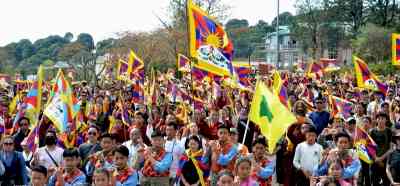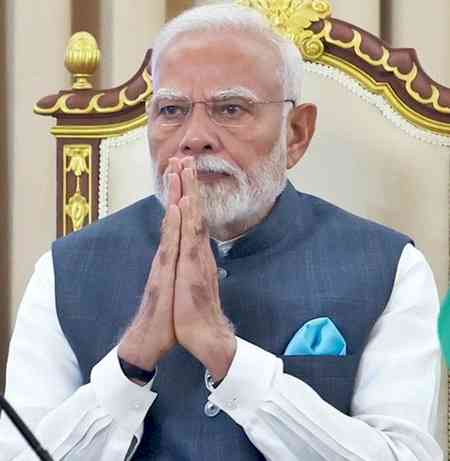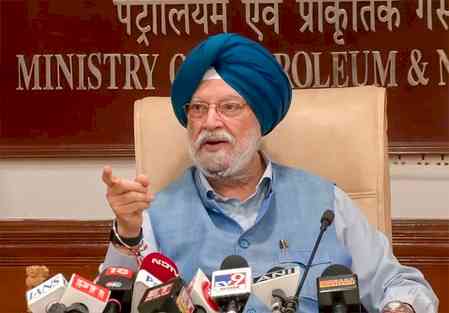Tibetans in exile endorse 'middle-way' policy on Tibet
The day Xi Jinping was unanimously elected president of China for a historic third term at the ongoing session of the 14th National People's Congress (NPC), the Central Tibetan Administration (CTA) on Friday hoped to find a mutually-agreeable way forward to discuss Tibet's future status based on the middle-way policy.

Dharamsala, March 10 (IANS) The day Xi Jinping was unanimously elected president of China for a historic third term at the ongoing session of the 14th National People's Congress (NPC), the Central Tibetan Administration (CTA) on Friday hoped to find a mutually-agreeable way forward to discuss Tibet's future status based on the middle-way policy.
"We are ready to engage with the PRC government based on equality and friendship to seek a mutually beneficial and lasting solution. Moreover, we urge the PRC government to immediately stop its flawed policy of eradicating the Tibetan identity," the CTA said here on the 64th anniversary of the Tibetan National Uprising Day.
The Tibetan administration, based in this hill station, observes March 10 as the day Chinese troops suppressed the Tibetan uprising in Lhasa in 1959, forcing the Dalai Lama and over 80,000 Tibetans into exile in India and other countries.
Welcoming the reintroduction of the bipartisan and bicameral Bill of Promoting a Resolution to the Tibet-China Conflict in both the Houses of the US Congress in February by House Foreign Affairs Committee Chairman Michael McCaul, Congressman Jim McGovern, Senator Jeff Merkley and Senator Todd Young, the Kashag (Cabinet), CTA's highest executive office, said it will reinvigorate the hope and determination of the Tibetan people.
"The Bill is aimed at finding a resolution to Sino-Tibet conflict while recognising the true historical status of Tibet and urgency of the current situation. Similarly, on December 14, the Canadian Parliament unanimously adopted a resolution endorsing the middle-way approach and supporting the resumption of a dialogue between the Tibetan representatives and the Chinese government.
"The Bill and Resolution will certainly give meaningful leverage to the middle-way approach as a win-win solution to the Sino-Tibet conflict."
His Holiness the Dalai Lama emphasises the cultivation of love, compassion and concern for the well-being of others with a sense of oneness of humanity.
"If we can practice his advice in our daily lives, it will certainly pacify the enmity in this world engulfed in war and overcome the problems of natural calamity, pandemic, and famine."
The Dalai Lama is not only the protector and symbol of Tibet and the Tibetan people, but also an unparalleled leader revered across the world for his commitment to promote human values and religious harmony, preservation of Tibet's Buddhist culture and revival of ancient Indian knowledge.
"We will resolutely oppose the PRC government's baseless accusations of labelling His Holiness the Dalai Lama as separatist and every attempt to obstruct His Holiness's meritorious service for the world. Moreover, the Chinese government will lose the key to resolve the Sino-Tibet conflict if it fails to positively recognise the historic bond between His Holiness the Dalai Lama and the Tibetan people and the reality of the current situation."
The cabinet, led by CTA's political leader Penpa Tsering, said the Chinese government, in the name of combating separatism and maintaining social stability, is controlling every movement of Tibetans with measures more draconian than the time of the Cultural Revolution.
Every town, village, street, pastoral areas and grasslands are constantly surveilled using latest technology through grid management system.
Last month, a so-called "Regulations on Network and Information Security" in TAR came into force. It tasked government departments, state and public organs above the county level to monitor and control information on the internet.
The regulation criminalises even forming and participating in social media group with "separatist forces".
The Chinese government has intensified its campaign of forcibly indoctrinating Tibetans, including students, nomads, farmers and even monks and nuns, with communist ideology.
Large-scale collection of data from Tibetans through DNA extraction, Iris scan and facial recognition are being carried in the name of social management, it added.
China regards the Dalai Lama as a dangerous 'splittist', or separatist. He believes in "middle-way" approach, meaning greater autonomy for Tibet rather than outright independence.
The Tibetan administration in exile is based in the north Indian hill town of Dharamsala.


 IANS
IANS 








